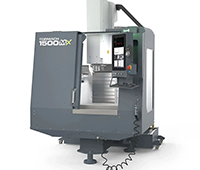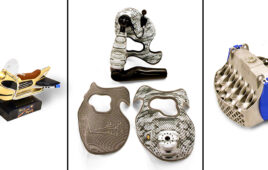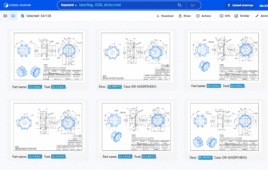 In order to assemble and deliver all parts and systems quickly, igus stocks more than 12,000 different iglidur types of plain bearings made of high-performance plastics. But sometimes customers demand plastic components from outside the catalogue. For this purpose, the company manufactures customised parts using various methods.
In order to assemble and deliver all parts and systems quickly, igus stocks more than 12,000 different iglidur types of plain bearings made of high-performance plastics. But sometimes customers demand plastic components from outside the catalogue. For this purpose, the company manufactures customised parts using various methods.
The type of production of customised parts is determined by the motion plastics specialist according to the required quantities. For large volumes starting at 500 pieces, the in-house tool manufacturer constructs application-related moulds made of steel, which are then used in the injection moulding machines. For small batches up to 500 pieces or prototypes, igus offers another solution for wear-resistant special parts via the speedigus production service. The speedigus services are divided into the speedimold, speedicut and speedifit divisions—according to the method that is most suitable for the respective application.
In addition to the use of metal tools, the speedimold process also covers the production of customised parts using injection moulding technology. There are two different methods: first, custom-made plastic plain bearings can be produced with 3D-printed injection moulds (print2mold) and second, with the aid of machined aluminium tools. The injection moulding process used gives customers the opportunity, for testing purposes such as the service life test, to obtain products ready for mass production. In the print2mold process, users can choose for their custom-made part from more than 50 different iglidur tribological materials optimised for friction and wear.
Subsequently, the material for the mould to be printed is adapted to the material selected by the customer. Depending on the material, the next step is to produce the injection moulding tool using the appropriate 3D printing process and use it in the injection moulding machine. The material of the printed mould is tailored to withstand the high temperatures and pressure prevailing in injection moulding. You can produce from just one piece up to 500 parts, prototypes or small batches from a 3D-printed injection mould. In this way, the costs can be reduced by up to 80% compared to steel injection moulds for small quantities using the additive manufacturing process. The user also saves time as 3D-printed moulds can be made faster than steel tools. 3D-printed tools are often used for sampling and conducting tests of the original material.
For batches between 200 and 2,000 pieces, the injection moulded part can also be produced with an aluminium tool. The slim manufacturing method also saves the user time and money here: aluminium tools are also cheaper and faster to produce than steel moulds, as no lengthy hardening is required. The cost starts at $1,200. In addition, more precise geometries can be produced with aluminium. For these reasons, the aluminium moulds are mainly used to make standard and special parts in small batches in the injection moulding process. Depending on the complexity, the desired part is manufactured and delivered within three to a maximum of 21 days.
With speedicut, precise custom-made parts can be made still faster cost-effectively from the iglidur bar stock. The components are manufactured by the machining of bar stock. For simple components, this is the fastest and most economical method of producing individual parts in small and medium-sized batches, because doing without tools saves time and set-up costs. In addition, flexibility is maintained because changes to components are implemented quickly and easily without having to make costly adaptations to the tools. Machining also enables the production of precision parts with the tightest tolerances. Around half of the iglidur materials are available from stock as bar stock in the form of round bars, plates and tubes of various dimensions. In order to be able to offer as many sizes and materials as possible, the product range is being continually expanded and enhanced.
For the user, the speedicut process is straightforward: He/she sends a 3D model or a 2D drawing with the specifications of the desired material and quantity to igus online via upload. He or she then receives an offer within one working day, on the basis of which he/she can initiate an order. The speedicut parts are manufactured and shipped within one day in the best case; up to 100 parts at the latest within ten days.
With the speedifit service, igus assembles entire component assemblies and delivers them as ready-to-install components. There is no minimum order quantity. Both standard and customised iglidur plain bearings can be assembled in a housing made according to customer requirements, on request with matching shaft. Housings or assemblies can be made of any material. The most common materials for speedifit are aluminium, anodised aluminium, structural steel and stainless steel, as well as industrial plastics. In general, the delivery of a ready-to-install module results in the gain of valuable manufacturing and logistics time, as only one order needs to be generated: the customer has only one part number, one contact person and one price to deal with. The simplified procurement process increases productivity and reduces costs. Short delivery and assembly times mean lower project and process costs and ultimately increased cash flow.
Whether for prototypes or small batches, all production methods of the speedigus product range ensure fast and cost-efficient delivery of special parts and components.
You may also like:
Filed Under: MANUFACTURING






Tell Us What You Think!